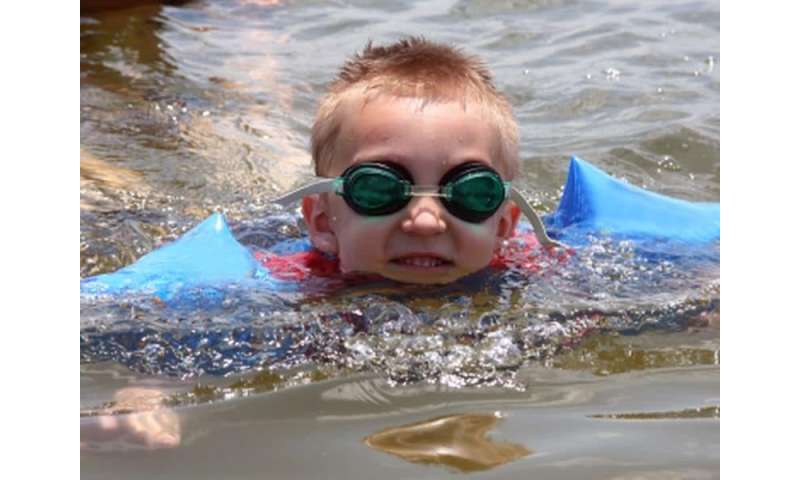Don’t get sick while swimming this summer


(HealthDay)—Swimming and summer are practically synonymous, but getting sick from bacteria in lakes, rivers and the ocean can spoil the fun, U.S. health officials warn.
Since 2009, nearly 120 disease outbreaks in 31 states have been tied to untreated recreational water. But being aware of potential harms and taking precautions can help keep you healthy while you cool off, according to a new report from the U.S. Centers for Disease Control and Prevention.
“Swimming is a great opportunity to be physically active, and we’re telling the public just do it in a smarter, more healthy way,” said report co-author Michele Hlavsa, chief of the CDC’s Healthy Swimming Program.
Contamination can occur from many sources, she said. These include storm water runoff, septic or sewer overflow, or water from farms or wastewater treatment plants. “They add poop to the water,” Hlavsa noted. Also, animals may defecate on the beach or in the water.
The most common infections are from bacteria, and include norovirus, Shiga toxin-producing E. coli, Cryptosporidium and Shigella.
These bacteria can cause nausea, diarrhea, vomiting and fever. Most often, these conditions go away by themselves, but for some, like kids and the elderly, these infections can be fatal. Older people with chronic conditions or compromised immune systems can be especially susceptible to getting sick.
“One of the outbreaks highlighted in this report involved a toxin-producing E. coli that can potentially cause a dangerous infection that can lead to hemolytic uremic syndrome,” Hlavsa said. This “can cause issues with the kidneys and potentially lead to death,” she explained.
Swallowing contaminated water is one of the most common ways of getting infected. She said children swallow twice as much water as those aged 18 and older. They may need reminders not to do so.
“This is not a year where we need an E. coli outbreak on top of a pandemic,” said Dr. Marc Siegel, a professor of medicine at NYU Langone Medical Center in New York City.
Data from the CDC’s National Outbreak Reporting System found that between 2009 and 2019, there were 119 outbreaks from recreational water in 31 states that sickened more than 5,200 people.
Almost 90% of these outbreaks got their start from June through August.
Hlavsa believes the problem is bigger than the data indicate, since most people who get sick from these bacteria don’t see their doctor or go to hospitals.
People who manage swimming areas have a responsibility to be sure the beach and water aren’t contaminated, she said.
“They should be regularly monitoring the water quality, looking for bacteria,” Hlavsa said. “They should also know the kind of geography and topography of the area surrounding the beach and the potential sources of contamination.”
For safe swimming, Hlavsa advises the following:
- Don’t swim when the pool or beach is closed, and check water quality advisories.
- Don’t swim when the water is cloudy after a heavy rain.
- Don’t swim when sick with diarrhea.
- Don’t swallow the water.
- Keep sand out of your mouth.
Siegel added that you shouldn’t let your kids swim if they aren’t toilet-trained. Kids who go to the bathroom in the water can be a source of bacterial infection. He also suggested wearing swim goggles to keep water out of your eyes.
Siegel said you won’t get COVID-19 in the water, but you could get it from people near you, so watch your surroundings carefully.
“Be doubly cautious because of COVID-19,” he advised. “Take a shower before and after swimming.” If you swim in a pool, “be sure it’s disinfected,” he said.
Another dangerous bacteria found in water is the so-called flesh-eating bacteria V. vulnificus, which can cause life-threatening wound infections.
However, Siegel noted that this is extremely rare and not something people really need to worry about.
The CDC says that only 205 cases of V. vulnificus occur each year, and that’s among millions of Americans who swim in lakes and oceans. Still, 1 in 7 do die from the infection, and the agency advises staying out of salt water or brackish water if you have a cut or scrape.
Source: Read Full Article